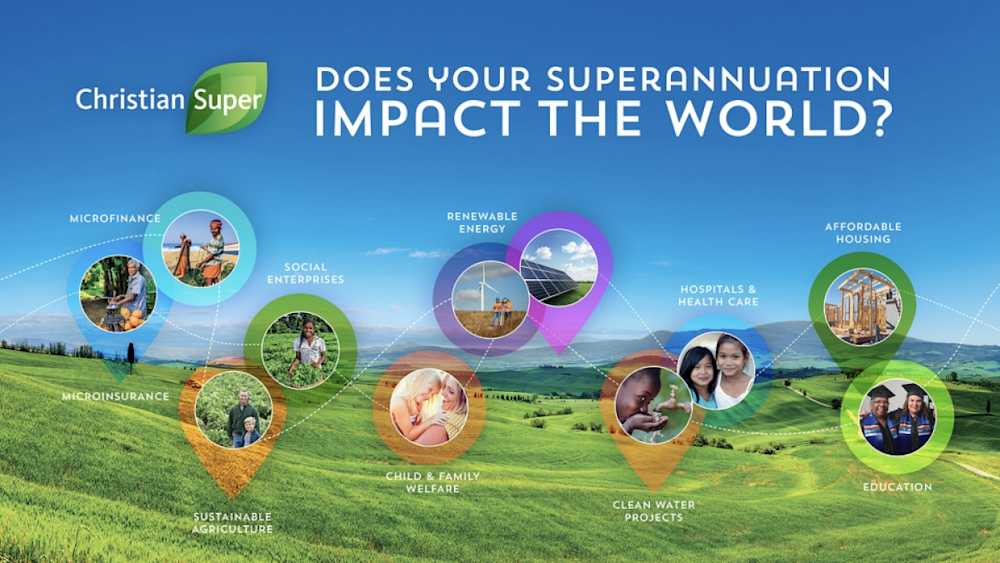New shareholder
Invest in what you believe in
In June 2019, Australian pension fund Christian Super took a significant minority shareholding in responsAbility Investments and became the company’s first non-Swiss institutional investor. In this interview, Christian Super CEO Ross Piper explains what his company expects from this investment going forward.

Ross Piper
has over 25 years of leadership and management experience in corporate and non-profit contexts. Prior to his appointment as Christian Super CEO in Jan 2018, he was COO with World Vision Australia and also served with World Vision International for several years in the Middle East and various countries of the former Yugoslavia. During his career Ross has held a number of positions in the corporate sector, primarily in investment banking (Macquarie) and mining (Rio Tinto). He currently sits on the Board of the Responsible Investment Association of Australia (www.responsibleinvestment.org) and SEED (www.seed.org.au).
Why did Christian Super decide to invest in responsAbility?
We have a broad impact portfolio with a range of different investment types and assets. As we continue to build our portfolio, we recognized the value of investing in a business where there was a clear values alignment, a strong capability, a positive reputation and a good exposure across a range of emerging markets and sectors. So, both from a values perspective as well as from a commercial standpoint, we saw a significant opportunity for this business to continue growing.
“We saw a strong capability, a positive reputation and a good exposure across a range of emerging markets and sectors.”
Ross Piper, CEO Christian Super
You are active in the Australian market where pension schemes are compulsory and members get to choose which pension fund they want to join. How does the investment in responsAbility fit in with your need to position yourselves in the market?
One of the reasons why our fund has been successful and continues to grow is our strong focus on ensuring we invest our members’ money in line with their values and beliefs. Our fund has been a pioneer and leader in impact investing for many years and has established credibility and a deep knowledge of the global market. Whilst there may not be an immediate awareness of responsAbility among Australian consumers, there is certainly an expectation from our members that we are partnering commercially with the most capable providers in the market who will deliver positive societal or environmental impact as well as strong commercial outcomes.

Why did you feel that adding responsAbility to your portfolio was a good opportunity?
responsAbility has a strong cross-regional footprint and sector diversity, with business lines at varying stages of growth and profitability, and we see significant upside growth opportunity in the emerging markets and sectors where the business has exposure. responsAbility strongly matched the core criteria that we set, because of the values alignment and a track record of success, along with a potential runway of significant growth and expansion. On a personal level, our CIO Tim Macready and responsAbility’s CEO Rochus Mommartz, had known each other for some time. It’s important to have shareholders and investors that will not take the business in a direction that is at odds with its core mission and purpose. Equally for us as an investor, we saw responsAbility’s strong commitment to an imperative of sustainable growth of impact investing whilst also generating long-term financial returns as a good fit for our fund and members.
“responsAbility has a strong cross-regional footprint and sector diversity, with business lines at varying stages of growth and profitability.“
Ross Piper
Why did you decide to invest in the company rather than in one of the funds it manages?
This was a deliberate choice. The key appeal in investing in responsAbility as a whole was the opportunity to further diversify our impact investment portfolio, and to invest in a strong partner operating across markets and sectors where growth opportunities are strong. These factors, in line with our investment return requirements, lined up to see investment in responsAbility as a strong value addition to the overall portfolio. The breadth of responsAbility businesses and geographies means that, although market cycles will go up and down, there is a long-term view of the strong potential for growth in emerging markets. Investing in responsAbility gives us a broad, well-managed exposure to that upside potential.
“The key appeal in investing in responsAbility as a whole was the opportunity to invest in a strong partner operating across markets and sectors where growth opportunities are strong.”
Ross Piper
You are a for-profit institution and have a strong fiduciary duty. What makes responsAbility a good investment financially?
If we look simply at the demographics and social forces shaping emerging markets, there is significant growth potential from a purely commercial standpoint, but there are also significant opportunities for businesses addressing social and environmental needs. Investment in a business like responsAbility gives us good exposure to both, whilst also enabling a reasonable diversification of risk. Businesses like responsAbility are also well positioned in the market to leverage the growing interest from institutional investors in larger scale investment opportunities that can deliver on market-rate risk return requirements, whilst also delivering an impact imperative. There are a number of societal and regulatory forces that are driving this increased institutional investor interest, and we don’t think these will abate any time soon.
“Businesses like responsAbility are well positioned in the market to leverage the growing interest from institutional investors in larger scale impact investment opportunities.”
Ross Piper
We are currently witnessing mainstream players moving into the impact investment space on a big scale. How does this impact the positioning of market pioneers like Christian Super or responsAbility?
Firstly, we would celebrate the fact that things are moving from niche to mainstream. We have a firm view as investors that capital can be deployed in a manner that is good for society and good for the planet without compromising investment returns. There is certainly some complexity and different risks in investing in this way, but alignment with our members’ beliefs, values and interests in how we invest is a core principle for us. The concept of a purposeful retirement is also an important one for our fund. We care deeply about the sort of world our members will retire in to, and the emergence of more mainstream players in the impact investing space is a good story and a good opportunity if it directs more capital to areas of social or environmental need.
Does that introduce a degree of commercial risk? Potentially. But our own experience indicates that impact investment, and the capability to do impact investment well, is not something that you can quickly create or establish. The barriers to entry for others coming in to replicate what a business like responsAbility is doing are relatively high – at this point anyway.
“We have a firm view as investors that capital can be deployed in a manner that is good for society and good for the planet without compromising investment returns.”
Ross Piper
There is no universal approach to impact measurement. How important is it to find a way that will be broadly accepted – by the industry and, especially, by your stakeholders?
It’s important that we continue to engage with the challenges of scaling the impact market with integrity. I think it is very important that, as the industry evolves and grows, there is a commensurate strengthening of consistency and practice around impact measurement and reporting. Development is not a perfect science, and whilst there are some who advocate moving to almost an accounting standards type framework, my own experience, particularly on the development side of the fence, suggests that it will be challenging to do that elegantly and simply.
So-called ‘impact washing’ is certainly a risk, especially as consumer demographics and interests start to drive a stronger market positioning element on impact. The continued development of standards and practice is positive, and there’s good work being done across the sector in this regard. We have engaged closely with the ongoing work of the Impact Management Project and also the development and launch of the IFC Operating Principles for Impact, of which both Christian Super and responsAbility are early signatories. Given Christian Super’s broad recognition as a pioneer in impact investing for pension funds, we are conscious of our role to lead and influence well, and to work collaboratively with other investors in Australia and abroad who are seeking to move into this space. We want to continue to play our part in helping the industry scale with integrity.
“We want to continue to play our part in helping the industry scale with integrity.”
Ross Piper
Going forward, where do you see potential synergies between Christian Super and responsAbility? Which best practices can each partner adopt?
I think there are many. The impact investing world globally is still closely networked and relational. Many stakeholders are required to facilitate market building and the overall growth of the impact investing ecosystem, and in this regard there are a number of synergies between the work of Christian Super and responsAbility. In particular our geographic location and focus in the Asia Pacific region can be leveraged to open up new distribution channels and potential investment and deal sources for responsAbility.
In 2016, Christian Super established Brighlight (www.brightlightimpact.com), which is an independent impact advisory and funds management business. Brightlight operates as an intermediary across multiple markets, product development and investor mobilisation, including working with the Australian Government and many other DFIs. It is likely that a number of synergies and collaboration opportunities will emerge over time, particularly in the Asia Pacific region. So, whether it’s a direct partnership, whether it is simply a referral or networking or the ability to actually construct working opportunities in a collaborative way, some of that may actually translate into formal deal opportunities, some of it may simply be about leveraging synergies and identifying opportunities where there is a strong fit with either responsAbility or other players.
How can Christian Super benefit from responsAbility’s expertise?
We see many opportunities for this. Our team has already been engaging with responsAbility in the area of impact measurement and reporting. The work that responsAbility has done in impact reporting, the learnings that you are putting in place, are very helpful for us. And there is a functional benefit in how we can leverage some of those learnings.
But then there is a broader qualitative sense of how we tell the story of the work that responsAbility is doing in the context of our impact portfolio. Our fund’s investment in responsAbility is an amplifier in this regard, given the breadth of the responsAbility portfolio. Our marketing team are excited by the prospect of partnering closely and profiling and promoting many aspects of the work responsAbility is doing to our members – because it’s ultimately our members who are now stakeholders in this company.
How we measure impact Impact & ESG
You have a very diverse and broad background, both in investment and development work. Why are you personally excited about this investment?
For me, there is a personal connection in some of the assets that responsAbility is now deeply involved in. An example is Credo in Georgia. During my years with World Vision in countries of the former Yugoslavia and then later in the Middle East and Eastern Europe, I was closely involved with VisionFund and the establishment of a number of the microfinance institutions across Eastern Europe, including Credo. It is deeply encouraging to see the continued evolution, maturing and scaling up of these institutions. I am passionate about entrepreneurs in the developing world. It’s very often the lack of available capital that constraints SME growth. I believe the world’s most capable entrepreneurs are based in developing contexts. Microfinance and financial inclusion programs, when well implemented, can help to unlock the entrepreneurial potential of these countries, even where there may be population displacement or nascent conflict.
The other area of excitement for me with this investment is the scaling potential. With the portfolio responsAbility is currently managing and overseeing, there is the potential to bring in much larger investors over time in line with market building efforts. I am passionate about the ability to catalyze and leverage much larger sums of institutional capital into robust commercially strong investments from a financial standpoint that are deeply targeting an impact imperative and the SDGs. That’s a courageous and powerful story. For us, whilst we have had a long and very successful track record as impact investors, investing our members’ money in line with their values and beliefs, the investment in responsAbility further amplifies this narrative.
We are excited about this investment and this partnership. Looking forward to the journey forward!
“I am passionate about the ability to catalyze and leverage much larger sums of institutional capital into commercially strong investments that are deeply targeting the SDGs. That’s a courageous and powerful story.”
Ross Piper

Christian Super is a growing Australian pension fund with over 28,000 members and more than AUD 1.6 billion in funds under management. Operating since 1984, the fund invests its members’ retirement funds ethically in line with Christian values. They are also a world leader in impact investing, with around 10% of funds in investments that aim to generate both financial returns and positive social or environmental outcomes. In 2019, Christian Super became a signatory of the IFC Operating Principles.
